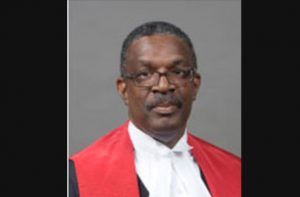By Svetlana Marshall
— following Jagdeo’s rejection of nominees for chancellor, chief justice posts
AN advice from the country’s Attorney General and Legal Affairs Minister, Basil Williams could determine President David Granger’s next move on the appointment of a substantive Chancellor of the Judiciary and Chief Justice after his proposed nominees were rejected by Opposition Leader Bharrat Jagdeo.
Justice Kenneth Benjamin and Madam Justice Yonette Cummings-Edwards were selected and recommended to the President by a panel comprising former Justice of Appeal, Claudette Singh, Justice James Patterson, and Professor Harold Lutchman, for the positions of Chancellor and Chief Justice respectively, but the Opposition Leader, in exercising his Constitutional right, rejected the nominees.
Presently, Justice Cummings-Edwards is the acting Chancellor and Justice Roxane George-Wiltshire is the acting Chief Justice, but President Granger is hoping to have substantive appointments made.

“We cannot be without a Chancellor and a Chief Justice, and right now, two persons are acting and I had hoped that we could have moved forward by having substantive or fulltime appointment agreed, but this has not happened and the Constitution requires me to await the approval of the Leader of the Opposition and this hasn’t come, so I will have to depend on legal advice and make sure the courts continue to function,” President Granger said.
He added: “It is not desirable to continue the practice as acting which existed for several years and I would like to have a substantive appointment.”
The President made it clear that he would not allow the work of the judiciary to be stymied by a single person.
“It is a question of necessity; it is a question of necessity. The courts cannot be paralysed by the behaviour of one person. After the first meeting, I waited nearly a month and I was, I would say, disappointed at the final outcome but that is his constitutional decision,” he said.
Though Jagdeo rejected Justice Benjamin and Justice Cummings-Edwards for the posts of Chancellor and Chief Justice respectively, the Constitution provides for the President to appoint them in acting capacities after consultation with the Opposition Leader.
The Constitution also requires that the nominees for the two top judicial positions be appointed by the President, after agreement with the Leader of the Opposition.
A consultative meeting was held on January 3, 2018, and President Granger had furnished the Opposition Leader with the curriculum vitae of the nominees, while outlining the process for selection. But after requesting a month to analyse the curriculum vitae of the two nominees, Jagdeo rejected them.
According to Article 127 of the Constitution of Guyana, “the Chancellor and the Chief Justice shall each be appointed by the President, acting after obtaining the agreement of the Leader of the Opposition.”
Guyana has been without a substantive Chancellor since 2005, when the then Chancellor, Desiree Bernard, retired and took up the post as judge of the Caribbean Court of Justice (CCJ) the same year. The non-appointment of a substantive Chancellor and Chief Justice is a result of the government and opposition sides not agreeing to the candidates for the post. President of the Caribbean Court of Justice (CCJ), Sir Dennis Byron, during the Bar Association dinner in November, had underscored the importance of having a substantive chancellor of the judiciary and chief justice in place soon.


.jpg)











